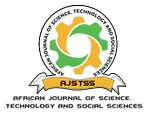Microresearch
towards sustainable health research during uncertain times
DOI:
https://doi.org/10.58506/ajstss.v1i1.22Abstract
Objectives: (a) to show that investment in research is an extremely wise move for any country, (b) to illustrate how research influences health decisions, and (c) to illustrate pathways in the “decolonization” of research in low- and middle-income countries (LMIC).
As shown by data compiled by UNESCO (Figure), the Gross Expenditure on Research and Development (GERD) as percent of national GDP greatly enriches its citizens (it’s an investment). For example, the Netherlands (NL), a country with few natural resources, invests heavily in research and has achieved a high level of prosperity for its citizens. Economists concluded that research is an essential investment for a country’s prosperity!
The decision-making process by any government is a complex process influenced by budgetary, political, legislated, and other considerations. The importance of “embeddedness” in this process was identified by Koon et-al. who showed that ministerial decisions on health are primarily influenced by people who have a reputation for research and work within the local system. This phenomenon is seen in both rich and poor countries; people who know and understand the culture and context of a country are key influencers on the decision process.
The challenges of LMIC to develop capacity in research was the topic of a UNESCO conference in Bamako Mali in 2008. Ministers-of-health from LMICs realized that research is critical in any decision process to ensure “evidence-informed” policy decisions. Their “Call to Action” recognized an essential need to build community-based research capacity to ensure health agendas would be decided by national needs informed by their own researchers.
The pathway to decolonization began anew in 1976 with the introduction of Microfinance offering startup funding, capacity-development, and coaching for local people with entrepreneurial ambition. Like Microfinance, MicroResearch (MR) is an innovative, capacity building, community-focused program, empowering local health researchers to improve health in their communities. Conceived in 2008 MR puts local research teams firmly in the driver’s seat from question selection, proposal development to knowledge translation. As of 2022:
- 19 partner institutions in 8 countries
- Over 40 two-week training workshops
- 1,250 health workers and professionals trained
- Including >300 doctors, >200 nurses and 600 other professions
- 126 MR teams have launched research projects (over 50 completed)
- Over 50 PubMed publications and/or policy changes
- Thousands of lives saved as a result of MR research-initiated changes
- MR training programs have been incorporated into local institutes
MR has shown that high-quality research can be achieved locally when supported by training, coaching and access to small grants. MR decolonizes and democratizes research in LMIC.


